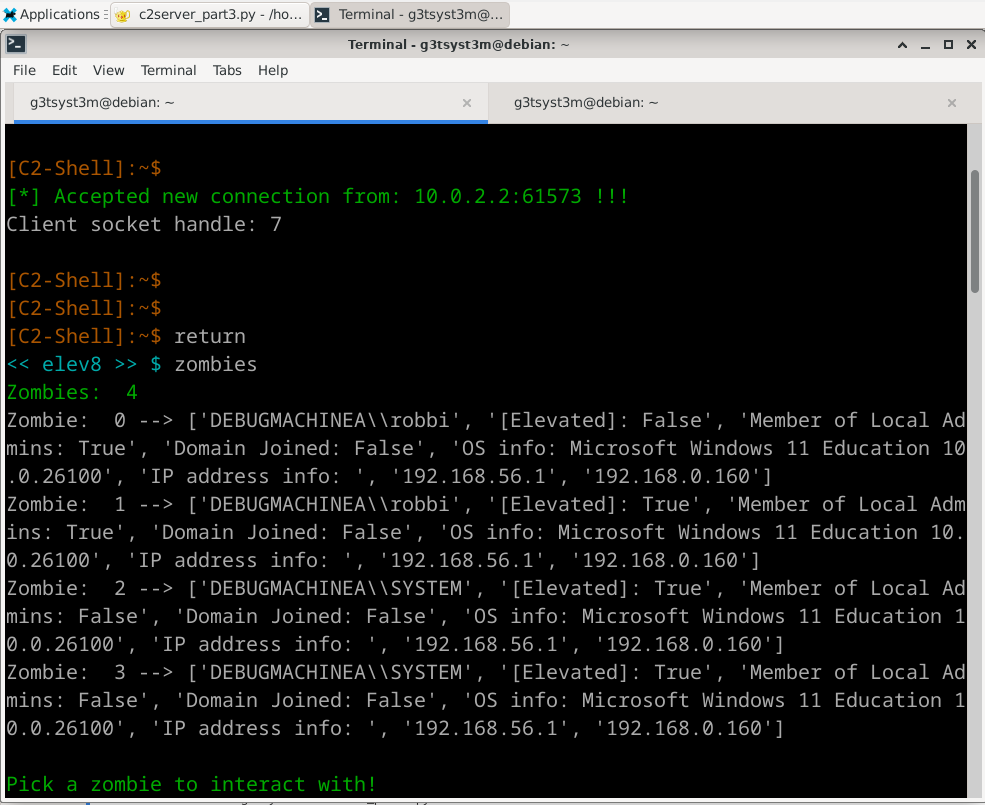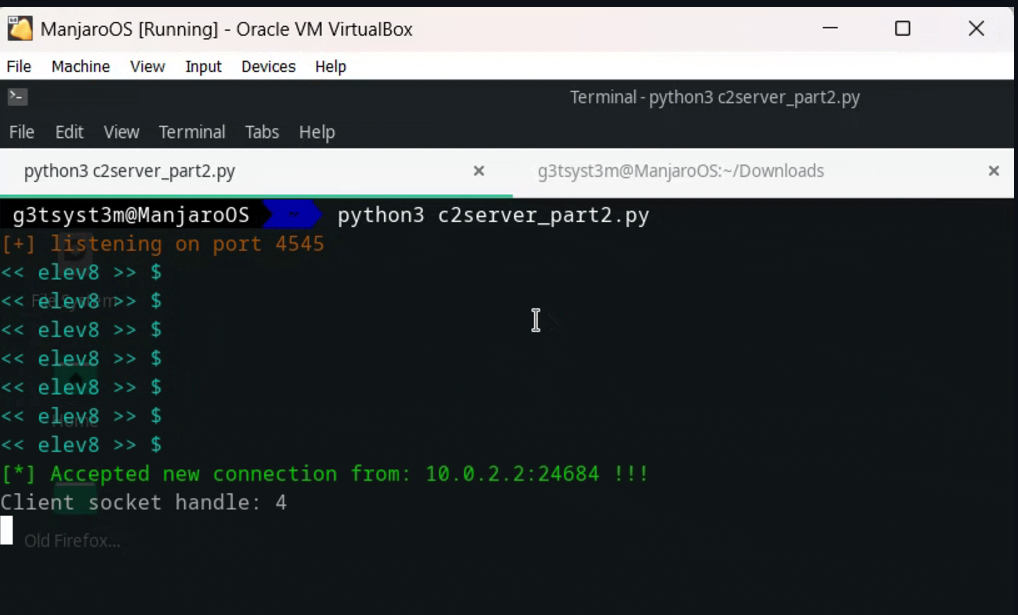x64 Assembly & Shellcoding 101 - Part 5
Well, you will all be happy to know I’m finally keeping my word and doing what I promised early on in the series…We’re going to do the following today:
(Our code will not contain any NULL values btw)
- Locate Kernel32 and collect PE Export Table info
- Dynamically Locate GetProcAddress
- Use the handle to GetProcAddress to locate the address for LoadLibraryA
- Use the handle to GetProcAddress to locate ExitProcess
- Use the handle to LoadLibraryA to load user32.dll
- Use the handle to user32.dll to locate the address of MessageBoxA within user32.dll using GetProcAddress
- Pop the messagebox (not a literal assembly pop operation 😅 )
- call ExitProcess to exit gracefully!
Before we dive in, I’d like to point out something I noticed while revisiting x64 assembly. Maybe it’s just me, but in reviewing the PE export table for Windows 11, it seems like the address of names index lines up with address of functions. Such that, we don’t need to resort to getting the ordinal using the address of names index any longer. I could be mistaken, but I’ve tested this on Windows 11 on two separate machines and same outcome. I skipped using the ordinal lookup entirely and had no issues just plugging in the index I retrieved from the address of names lookup into the address of functions lookup. Food for thought. Maybe that should be expounded on further by someone who knows way more about Windows internals than I do 😆 With that little thought out of the way, let’s carry on shall we?
Today’s code will be the most challenging yet in the series, so fair warning. There’s a lot going on but I think you’ll do just fine. I’ll break it down into sections, borrowing from the bullet points above.
Prologue - Locate Kernel32 and collect PE Export Table info
;nasm -fwin64 [x64findkernel32.asm]
;ld -m i386pep -o x64findkernel32.exe x64findkernel32.obj
BITS 64
SECTION .text
global main
main:
sub rsp, 0x28
and rsp, 0xFFFFFFFFFFFFFFF0
xor rcx, rcx ; RCX = 0
mov rax, [gs:rcx + 0x60] ; RAX = PEB
mov rax, [rax + 0x18] ; RAX = PEB->Ldr
mov rsi,[rax+0x10] ; PEB.Ldr->InLoadOrderModuleList
mov rsi, [rsi]
mov rsi,[rsi]
mov rbx, [rsi+0x30] ; kernel32.dll base address
mov r8, rbx ; mov kernel32.dll base addr into r8
xor rcx, rcx ; Avoid null bytes from mov edx,[rbx+0x88] by using rcx register to add
add cx, 0x88ff
shr rcx, 0x8 ; RCX = 0x88ff --> 0x88
mov edx, [rbx+rcx] ; EDX = [&NewEXEHeader + Offset RVA ExportTable] = RVA ExportTable
add rdx, r8 ; RDX = kernel32.dll + RVA ExportTable = ExportTable Address
mov r10d, [rdx+0x14] ; Number of functions
xor r11, r11 ; Zero R11 before use
mov r11d, [rdx+0x20] ; AddressOfNames RVA
add r11, r8 ; AddressOfNames VMA
mov rcx, r10 ; store number of functions for future use
Dynamically Locating GetProcAddress
mov rax, 0x9090737365726464 ; 'ddress'
shl rax, 0x10 ; 7373657264640000
shr rax, 0x10 ; 0000737365726464 terminate our string w/ no nulls present in our shellcode!
push rax
mov rax, 0x41636F7250746547 ; GetProcA
push rax
mov rax, rsp
kernel32findfunction: ; Loop over Export Address Table to find WinApi names
jecxz FunctionNameNotFound ; Loop around this function until we find GetProcAddress
xor ebx,ebx ; Zero EBX for use
mov ebx, [r11+rcx*4] ; EBX = RVA for first AddressOfName
add rbx, r8 ; RBX = Function name VMA / add kernel32 base address to RVA and get WinApi name
dec rcx ; Decrement our loop by one, this goes from Z to A
mov r9, qword [rax] ; R9 = "GetProcA"
cmp [rbx], r9 ; Compare first 8 bytes
jnz kernel32findfunction ; If not equal, continue loop
mov r9d, dword [rax + 8] ; R9 = "ddress"
cmp [rbx + 8], r9d ; Compare remaining part
jz FunctionNameFound ; If match, function found
jnz kernel32findfunction
FunctionNameNotFound:
int3
FunctionNameFound:
push rcx
pop r15 ; getprocaddress position
inc r15
xor r11, r11
mov r11d, [rdx+0x1c] ; AddressOfFunctions RVA
add r11, r8 ; AddressOfFunctions VMA in R11. Kernel32+RVA for addressoffunctions
mov eax, [r11+r15*4] ; Get the function RVA.
add rax, r8 ; Found the GetProcAddress WinApi!!!
push rax ; push GetProcAddress temporarily to be used by next segment
I really wish it didn’t take so many lines of code to dynamically locate kernel32 + your initial API, but it’s been this way for a long time it seems. Thankfully, the other sections of code are much shorter and easier to follow, at least in my opinion. 😸
Locate the address for LoadLibraryA using GetProcAddress handle
; Prepare arguments for getting handle to LoadLibraryA:
pop r15 ; temporary use
mov r12, r15 ; save copy of GetProcAddress for future use
mov rdi, r8 ; make a copy of kernel32 base address for future use
mov rcx, r8 ; RCX = handle to kernel32.dll (first argument)
; Load "LoadLibraryA" onto the stack
mov rax, 0x41797261 ; aryA
push rax
mov rax, 0x7262694C64616F4C ; LoadLibr
push rax
mov rdx, rsp ; RDX points to "LoadLibraryA" (second argument)
sub rsp, 0x30 ; decimal 48 ( 3 x 16 bytes)
call r15 ; Call GetProcAddress
add rsp, 0x30 ; alignmnent/shadow space adjustments
mov r15, rax ; holds LoadLibraryA!
Locate the address for ExitProcess using GetProcAddress handle
;getexitprocess
mov r14, r12 ; temporary assignment of GetProcess handle
mov rcx, rdi ; RCX = handle to kernel32.dll (first argument)
; Load "ExitProcess" onto the stack
mov rax, 0x90737365 ; 'ess'
shl eax, 0x8 ; 0000000073736500
shr eax, 0x8 ; 0000000000737365 terminate our string w/ no nulls present in our shellcode!
push rax
mov rax, 0x636F725074697845 ; ExitProc
push rax
mov rdx, rsp ; RDX points to "ExitProcess" (second argument)
sub rsp, 0x30
call r14 ; Call GetProcAddress
add rsp, 0x30
mov r14, rax ; holds ExitProcess!
Locate user32.dll using LoadLibraryA handle
;locate user32.dll
mov rax, 0x90906C6C ; add "ll" string to RAX
shl eax, 0x10 ; 000000006C6C0000
shr eax, 0x10 ; 0000000000006C6C
push rax ; push RAX to stack
mov rax, 0x642E323372657375 ; Add "user32.d" string to RAX.
push rax ; Push RAX to stack
mov rcx, rsp ; Move a pointer to User32.dll into RCX.
sub rsp, 0x30
call r15 ; Call LoadLibraryA("user32.dll")
mov rdi, rax ; holds User32.dll address
Locate MessageBoxA address using user32.dll handle + GetProcAddress
; Prepare arguments for GetProcAddress for MessageBoxA:
mov rcx, rdi ; RCX = handle to user32.dll (first argument)
mov rax, 0x9041786F ; Load "oxA" into RAX
shl eax, 0x8 ; 0000000041786F00
shr eax, 0x8 ; 000000000041786F
push rax
mov rax, 0x426567617373654D ; Load "MessageB" into RAX
push rax
mov rdx, rsp ; RDX points to "MessageBoxA" (second argument)
sub rsp, 0x30
call r12 ; Call GetProcAddress
mov r15, rax ; store MessageBoxA
Pop the MessageBox!
;messageboxfinally:
xor rcx, rcx ; hWnd = NULL (no owner window)
mov rax, 0x9090906D ; m, 0
shl eax, 24 ; 000000006D000000
shr eax, 24 ; 000000000000006D
push rax
mov rax, 0x3374737973743367 ; g3tsyst3
push rax
mov rdx, rsp ; lpText = pointer to message
mov r8, rsp ; lpCaption = pointer to title
xor r9d, r9d ; uType = MB_OK (OK button only)
sub rsp, 0x30
call r15 ; Call MessageBoxA
add rsp, 0x30
Call ExitProcess
;exitcleanly:
xor ecx, ecx
call r14 ;ExitProcess
That’s it! Okay, now let’s go ahead and get our shellcode/machine code:
unsigned char shellcode[] =
"\x48\x83\xec\x28\x48\x83\xe4\xf0\x48\x31\xc9\x65\x48\x8b\x41\x60\x48\x8b\x40\x18\x48\x8b"
"\x70\x10\x48\x8b\x36\x48\x8b\x36\x48\x8b\x5e\x30\x49\x89\xd8\x8b\x5b\x3c\x4c\x01\xc3\x48"
"\x31\xc9\x66\x81\xc1\xff\x88\x48\xc1\xe9\x08\x8b\x14\x0b\x4c\x01\xc2\x44\x8b\x52\x14\x4d"
"\x31\xdb\x44\x8b\x5a\x20\x4d\x01\xc3\x4c\x89\xd1\x48\xb8\x64\x64\x72\x65\x73\x73\x90\x90"
"\x48\xc1\xe0\x10\x48\xc1\xe8\x10\x50\x48\xb8\x47\x65\x74\x50\x72\x6f\x63\x41\x50\x48\x89"
"\xe0\x67\xe3\x20\x31\xdb\x41\x8b\x1c\x8b\x4c\x01\xc3\x48\xff\xc9\x4c\x8b\x08\x4c\x39\x0b"
"\x75\xe9\x44\x8b\x48\x08\x44\x39\x4b\x08\x74\x03\x75\xdd\xcc\x51\x41\x5f\x49\xff\xc7\x4d"
"\x31\xdb\x44\x8b\x5a\x1c\x4d\x01\xc3\x43\x8b\x04\xbb\x4c\x01\xc0\x50\x41\x5f\x4d\x89\xfc"
"\x4c\x89\xc7\x4c\x89\xc1\xb8\x61\x72\x79\x41\x50\x48\xb8\x4c\x6f\x61\x64\x4c\x69\x62\x72"
"\x50\x48\x89\xe2\x48\x83\xec\x30\x41\xff\xd7\x48\x83\xc4\x30\x49\x89\xc7\x4d\x89\xe6\x48"
"\x89\xf9\xb8\x65\x73\x73\x90\xc1\xe0\x08\xc1\xe8\x08\x50\x48\xb8\x45\x78\x69\x74\x50\x72"
"\x6f\x63\x50\x48\x89\xe2\x48\x83\xec\x30\x41\xff\xd6\x48\x83\xc4\x30\x49\x89\xc6\xb8\x6c"
"\x6c\x90\x90\xc1\xe0\x10\xc1\xe8\x10\x50\x48\xb8\x75\x73\x65\x72\x33\x32\x2e\x64\x50\x48"
"\x89\xe1\x48\x83\xec\x30\x41\xff\xd7\x48\x89\xc7\x48\x89\xf9\xb8\x6f\x78\x41\x90\xc1\xe0"
"\x08\xc1\xe8\x08\x50\x48\xb8\x4d\x65\x73\x73\x61\x67\x65\x42\x50\x48\x89\xe2\x48\x83\xec"
"\x30\x41\xff\xd4\x49\x89\xc7\x48\x31\xc9\xb8\x6d\x90\x90\x90\xc1\xe0\x18\xc1\xe8\x18\x50"
"\x48\xb8\x67\x33\x74\x73\x79\x73\x74\x33\x50\x48\x89\xe2\x49\x89\xe0\x45\x31\xc9\x48\x83"
"\xec\x30\x41\xff\xd7\x48\x83\xc4\x30\x31\xc9\x41\xff\xd6";
And the c++ program itself:
#include <windows.h>
#include <iostream>
// Shellcode (as given, formatted for clarity)
unsigned char shellcode[] =
"\x48\x83\xec\x28\x48\x83\xe4\xf0\x48\x31\xc9\x65\x48\x8b\x41\x60\x48\x8b\x40\x18\x48\x8b"
"\x70\x10\x48\x8b\x36\x48\x8b\x36\x48\x8b\x5e\x30\x49\x89\xd8\x8b\x5b\x3c\x4c\x01\xc3\x48"
"\x31\xc9\x66\x81\xc1\xff\x88\x48\xc1\xe9\x08\x8b\x14\x0b\x4c\x01\xc2\x44\x8b\x52\x14\x4d"
"\x31\xdb\x44\x8b\x5a\x20\x4d\x01\xc3\x4c\x89\xd1\x48\xb8\x64\x64\x72\x65\x73\x73\x90\x90"
"\x48\xc1\xe0\x10\x48\xc1\xe8\x10\x50\x48\xb8\x47\x65\x74\x50\x72\x6f\x63\x41\x50\x48\x89"
"\xe0\x67\xe3\x20\x31\xdb\x41\x8b\x1c\x8b\x4c\x01\xc3\x48\xff\xc9\x4c\x8b\x08\x4c\x39\x0b"
"\x75\xe9\x44\x8b\x48\x08\x44\x39\x4b\x08\x74\x03\x75\xdd\xcc\x51\x41\x5f\x49\xff\xc7\x4d"
"\x31\xdb\x44\x8b\x5a\x1c\x4d\x01\xc3\x43\x8b\x04\xbb\x4c\x01\xc0\x50\x41\x5f\x4d\x89\xfc"
"\x4c\x89\xc7\x4c\x89\xc1\xb8\x61\x72\x79\x41\x50\x48\xb8\x4c\x6f\x61\x64\x4c\x69\x62\x72"
"\x50\x48\x89\xe2\x48\x83\xec\x30\x41\xff\xd7\x48\x83\xc4\x30\x49\x89\xc7\x4d\x89\xe6\x48"
"\x89\xf9\xb8\x65\x73\x73\x90\xc1\xe0\x08\xc1\xe8\x08\x50\x48\xb8\x45\x78\x69\x74\x50\x72"
"\x6f\x63\x50\x48\x89\xe2\x48\x83\xec\x30\x41\xff\xd6\x48\x83\xc4\x30\x49\x89\xc6\xb8\x6c"
"\x6c\x90\x90\xc1\xe0\x10\xc1\xe8\x10\x50\x48\xb8\x75\x73\x65\x72\x33\x32\x2e\x64\x50\x48"
"\x89\xe1\x48\x83\xec\x30\x41\xff\xd7\x48\x89\xc7\x48\x89\xf9\xb8\x6f\x78\x41\x90\xc1\xe0"
"\x08\xc1\xe8\x08\x50\x48\xb8\x4d\x65\x73\x73\x61\x67\x65\x42\x50\x48\x89\xe2\x48\x83\xec"
"\x30\x41\xff\xd4\x49\x89\xc7\x48\x31\xc9\xb8\x6d\x90\x90\x90\xc1\xe0\x18\xc1\xe8\x18\x50"
"\x48\xb8\x67\x33\x74\x73\x79\x73\x74\x33\x50\x48\x89\xe2\x49\x89\xe0\x45\x31\xc9\x48\x83"
"\xec\x30\x41\xff\xd7\x48\x83\xc4\x30\x31\xc9\x41\xff\xd6";
int main() {
// Allocate executable memory
void* exec_mem = VirtualAlloc(0, sizeof(shellcode), MEM_COMMIT | MEM_RESERVE, PAGE_EXECUTE_READWRITE);
if (exec_mem == nullptr) {
std::cerr << "Memory allocation failed\n";
return -1;
}
// Copy shellcode to the allocated memory
memcpy(exec_mem, shellcode, sizeof(shellcode));
// Create a function pointer to the shellcode
auto shellcode_func = reinterpret_cast<void(*)()>(exec_mem);
// Execute the shellcode
shellcode_func();
// Free the allocated memory
VirtualFree(exec_mem, 0, MEM_RELEASE);
return 0;
}
While it may seem like an unnecessarily large amount of code, it’s not too bad in the grand scheme of things. I’m showing 132 total lines of code in Notepad++. If we didn’t have to account for nulls it would be a lot less. But, this is not bad at all for how much is required to load a message box 😸 But it sure does feel good once it all comes together. Next up will be sockets and a reverse shell! Stay tuned and thanks for reading. I really do appreciate the support I receive and questions that arise from these posts. Keep em’ coming, and see ya soon!





Leave a comment